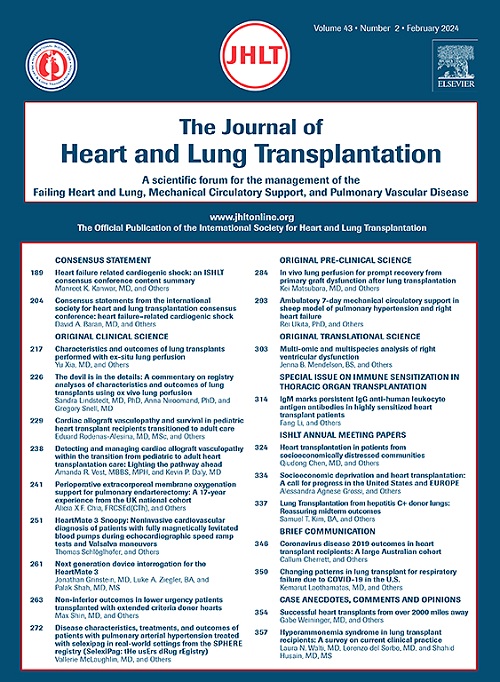Severe early graft dysfunction post-heart transplantation: Two clinical trajectories and diastolic perfusion pressure as a predictor of mechanical circulatory support
IF 6
1区 医学
Q1 CARDIAC & CARDIOVASCULAR SYSTEMS
引用次数: 0
Abstract
Background
Severe early graft dysfunction (EGD) is defined by mechanical circulatory support (MCS) <24 hours of heart transplantation (HT). We classified severe EGD based on timing of post-HT MCS: ‘‘Immediate’’ intra-operative vs ‘‘Delayed’’ post-operative MCS (after admission into intensive care unit (ICU) from operating theater). We hypothesized that (1) risk factors and clinical course differ between ‘‘Immediate’’ and ‘‘Delayed’’ MCS; and (2) diastolic perfusion pressure (DPP = diastolic blood pressure-central venous pressure) and Norepinephrine equivalents (NE = sum of vasopressor doses), as measures of vasoplegia are related to ‘‘Delayed’’ MCS.
Methods
Two-center study of 216 consecutive patients who underwent HT. Recipient, donor, vasopressor doses and hemodynamic data at T0 and T6 (on admission and 6 hours after admission into ICU) were collected.
Results
Of the 216 patients, 67 patients had severe EGD (‘‘Immediate’’ MCS: n = 43, ‘‘Delayed’’ MCS: n = 24). The likelihood of ‘‘immediate’’ MCS but not ‘‘delayed’’ MCS increased with increasing warm ischemic and cardiopulmonary bypass times on multinomial regression analysis with ‘‘no MCS’’ as the referent group. One-year mortality was highest in ‘‘Immediate’’ MCS vs ‘‘no MCS’’ and ‘‘delayed’’ MCS (34.9% vs 3.4% and 8% respectively, p < 0.001). Of the patients who had no immediate post-transplant MCS, DPP and NE at T6 were independently associated with subsequent ‘‘delayed’’ MCS. Sensitivity and specificity of NE ≥ 0.2 mcg/kg/min for ‘‘Delayed’’ MCS were 71% and 81%. Sensitivity and specificity of DPP of ≥40 mm Hg for No MCS were 83% and 74%. The discriminatory value of systemic vascular resistance for ‘‘Delayed’’ MCS was poor.
Conclusion
Risk factors and 1-year survival differed significantly between ‘‘Immediate’’ and ‘‘Delayed’’ post-HT MCS. The latter is related to lower DPP and higher NE, which is consistent with vasoplegia as the dominant pathophysiology.
心脏移植术后严重的早期移植物功能障碍:两种临床轨迹和作为机械循环支持预测因子的舒张灌注压。
背景严重的早期移植物功能障碍(EGD)是指心脏移植(HT)后机械循环支持(MCS)时间小于24小时。我们根据心脏移植术后机械循环支持的时间对严重移植物功能障碍进行了分类:术中 "即时 "机械循环支持与术后 "延迟 "机械循环支持(从手术室进入重症监护室(ICU)后)。我们的假设是:(i) "即刻 "和 "延迟 "MCS 的风险因素和临床过程不同;(ii) 舒张灌注压(DPP=舒张压-中心静脉压)和去甲肾上腺素当量(NE=血管舒张剂剂量总和)作为血管痉挛的测量指标与 "延迟 "MCS 有关。结果在 216 例患者中,67 例患者有严重的 EGD("即刻 "MCS:43 例,"延迟 "MCS:24 例)。在多项式回归分析中,以 "无 MCS "为参照组,"即刻 "MCS 而非 "延迟 "MCS 的可能性随着暖缺血时间和心肺旁路时间的增加而增加。与 "无 MCS "和 "延迟 "MCS 相比,"立即 "MCS 的一年死亡率最高(分别为 34.9% vs 3.4% 和 8%,P<0.001)。在移植后未立即发生 MCS 的患者中,T6 时的 DPP 和 NE 与随后发生的 "延迟 "MCS 独立相关。NE≥0.2mcg/kg/min对 "延迟 "MCS的敏感性和特异性分别为71%和81%。DPP≥40mmHg 对无 MCS 的敏感性和特异性分别为 83% 和 74%。结论 "即刻 "和 "延迟 "HT 后 MCS 的风险因素和一年生存率存在显著差异。后者与较低的 DPP 和较高的 NE 有关,这与血管痉挛是主要病理生理学相一致。
本文章由计算机程序翻译,如有差异,请以英文原文为准。
求助全文
约1分钟内获得全文
求助全文
来源期刊
CiteScore
10.10
自引率
6.70%
发文量
1667
审稿时长
69 days
期刊介绍:
The Journal of Heart and Lung Transplantation, the official publication of the International Society for Heart and Lung Transplantation, brings readers essential scholarly and timely information in the field of cardio-pulmonary transplantation, mechanical and biological support of the failing heart, advanced lung disease (including pulmonary vascular disease) and cell replacement therapy. Importantly, the journal also serves as a medium of communication of pre-clinical sciences in all these rapidly expanding areas.

 求助内容:
求助内容: 应助结果提醒方式:
应助结果提醒方式:


